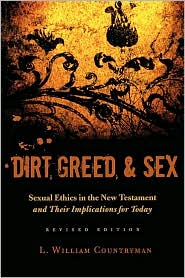Friday, January 22, 2010
Countryman - Dirt, Greed, and Sex: A Book Review
William Countryman, Dirt, Greed, and Sex, Fortress 2007.
This book is a brilliant and challenging survey of New Testament sexual ethics. What is unique about it (at least in my experience) is that it approaches these issues, not through the grid of our own modern approach to such matters but seeks to reconstruct the grid which those in the world of the NT would have used. This book is frequently cited in other literature and usually accompanied by the word "provocative." I took this to mean that not everyone liked the conclusions but they weren't interested in arguing the point right now. How ever I think it is a fair word to use of the book. It has two levels to it. On one level it is an excellent attempt at bring the reader into a different way of looking at sex and, as far as I can tell, from the point of view of 1st century Christians. On the other hand this book is not written into a vacuum and while the book is hardly dedicated to the gay debate it is nonetheless intended as a contribution to it and it is where things come closest to this topic that I think the book is at it weakest.
The first major section is dedicated to the concept of purity, drawing heavily on the work of Mary Douglas Countryman first shows how purity considerations operated in the OT and 1st century Judaism. He argues that while we moderns hapily differentiate between say food hygene and sexual purity, the ancient world had no concept of germs, genetics or STDs and treated all purity considerations as of one set. Countryman then goes on to show how the NT reframes purity considerations from external matters (food, dead people, sex, etc) to that of the heart (motive, intention, love, hate, etc). Countryman concludes that for the NT purity considerations are no longer binding on the conduct of Christians for any area of life, including the sexual.
The second section moves onto what for Countryman is the other major ancient concept for sexual ethics, property. Countryman persuasively demonstartes how sexual transgressions were primarily conceived of as transgressinos against the property of another. he demonstrates the OT and second temple judaism backgrounds for this and then shows how the NT both retains this understanding but also radically modifies it. This section of the book is the most exciting as Countryman skillfully explicates how Jesus' prohibition against divorce served to deconstruct the system of patriarchy. Countryman then traces this impetus through Paul but concludes that the later NT writings show evidence of a reversion to patriarchy and that even Paul was never consistent in applying this new radical approach to the equality of the sexes.
The final (and shortest) section contains a summary and then Countryman's suggestions for how his exegesis of NT sexual ethics might be aplied today. This is by far the weakest section. Countryman's arguments here lack the thoroughness and consistency he (generally) applied to the earlier sections. While many of his conclusions are hard to disagree with his ethical method is rather slipshod and he spends too little time working on how to move from the NT to today but merely seems to muse on how his findings affect his selection of topics.
With regard to the gay debate, Countryman's own agenda appears to affect the exegesis negatively at a couple of points, not least his discussion of malkoi and arsenokoitai in 1 Cor 6:9-11 (pp195-6) and of Luke 7:1-17 (pp75-6, 246, 327). 1 Cor 6:9-11 especially is a big issue and I hope to blog specifically on it later as it bears on my own thesis. What he succeeds in doing, very well, is showing the ambiguity of those NT texts which are often used to forbid homosexuality. This is a point that needs to be made, however to the educated it should hardly be surprising as "homosexuality" per se was not a concept for either Jew or Gentile in the first century, it is a modern idea.
Overall I am grateful for a very well written book that has given me a lucid and extremely helpful introduction to NT sexual ethics. By comparison the other books I've read have tended to both treat NT ethics as if they were written about our (modern) problems and be as dull as ditch water. In particular the insight that NT sexual ethics revolve around concepts of property (why has no one else pointed this out to me!!!???) is a vital insight for my work on 1 Cor 6:12-20 and will be an important shaping factor for my final conclusions. Already it is an insight that has made sense of a lot of loose ends for me and I'll be keeping the book close for the next few months.
[I have also quoted from the book here and here.]
Subscribe to:
Post Comments (Atom)
A Fresh Crop of New Blogs
I've been hearing rumours that blogging is making a comeback. Some of us never went away, but I admit, it's been slim picking round ...
-
James McGrath's blog really is a mighty blog. He is single handedly responsible for sending over 80 readers to this weeks carnival. If y...
-
I know it has been a lean year for my long suffering blog readers, but as a sign i still love you, and that the rivers of xenos have not yet...
-
I've been hearing rumours that blogging is making a comeback. Some of us never went away, but I admit, it's been slim picking round ...

No comments:
Post a Comment